16.09.22 Spellings
This week, we’ve been learning about words that contain a double consonant following a short vowel sound. Learn the following words for a test on Friday 23rd September:
accommodate
accompany
aggressive
apparent
appreciate
attached
correspond
embarrass
exaggerate
immediately
If you are finding these spellings difficult to practise at home, here’s an alternative list that follows the same spelling rules:
apple
cliff
glass
spell
shell
Note: There will be a spelling test for each set of words, so don’t worry about having to learn both!
Reading Records
Today, the children will be bringing home their new reading records. Please write a comment about your child’s reading in the parent comments section and bring the reading record back to school every Wednesday. We will send the reading record back home again on a Friday. Your child’s new e-book will be issued on a Friday.
16 September 2022
There’s a social theme to this week’s Talk Time.
In our school, we have 3 school rules:
- We keep our hands, feet and objects to ourselves.
- We follow instructions.
- We respect everyone and everything.
Is it important to have rules to follow in and outside of school? Is there a rule that we’re missing?
This week’s R2s (‘remember tos’) will help you to provide a balanced argument before you reach a conclusion:
- What are the reasons for having rules to follow (the pros)?
- What are the reasons against having rules to follow (the cons)?
- Reach a decision. Is it valuable to have rules to follow?
- One list may have more points than the other.
- Some points have a greater importance than others.
One way to approach this Talk Time is to have a debate with people in your household. This will not only help you generate ideas but also practise a range of oracy skills. Last year, one of the oracy focuses was building on the views of others and reasoning. When someone raises a point that you’re in agreement with, use one of the following phrases to start your response:
- I agree with you because…
- That’s a good point. I also think that…
- Furthermore, I’ll add that…
On the other hand, you may disagree with a point made by a family member. When that’s the case, it can be hard not to interrupt them. Another oracy focus from last year was turn-taking. To be respectful of others’ opinions, wait until a person has finished speaking and then respond using one of these sentence starters or one of your own:
- I hear what you’re saying but…
- That’s a good point. However…
- I take your point but…
History topic – The Great Fire of London
We have started our topic and we are learning all about The Great Fire of London. We are using a book, Vlad and the Great Fire of London, to stimulate our learning. (This is a YouTube link. Top tip for watching YouTube with your child: go to the settings cog along the play bar and turn off autoplay – this avoids an inappropriate clip coming up automatically, and helps to discourage your child from passively watching clip after clip.)

We have started by talking about the topic vocabulary, which you can see below. Help your child at home by exploring the information on the BBC bitesize website.

Look at our amazing learning. These are all the key facts we already know about the Great Fire of London!

History: What is chronology?
Year 4 have been exploring chronology.
Chronology is a word meaning ‘the study of time‘. We found out that it comes from the Greek words chronos (time) and logos (word).
Putting events in chronological order means: listing them in the order in which they happened. When things are put in chronological order it can sometimes be called a “timeline“.
The children had a go at putting historic time periods onto a timeline.
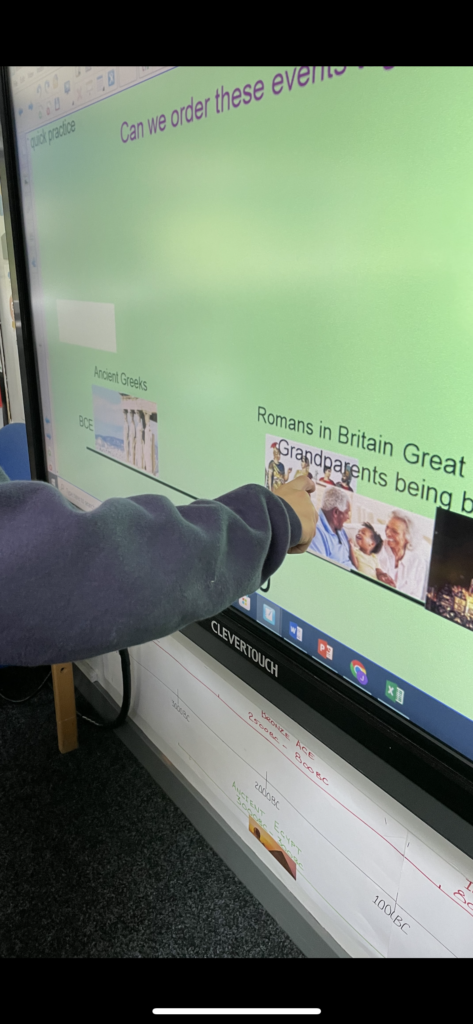
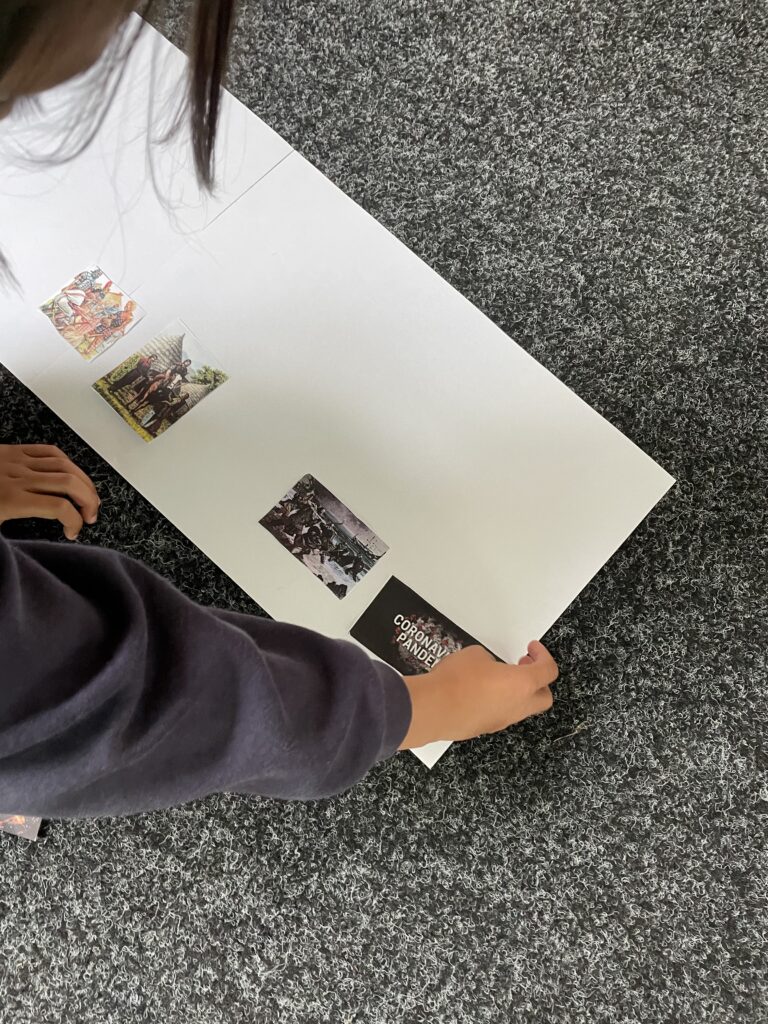
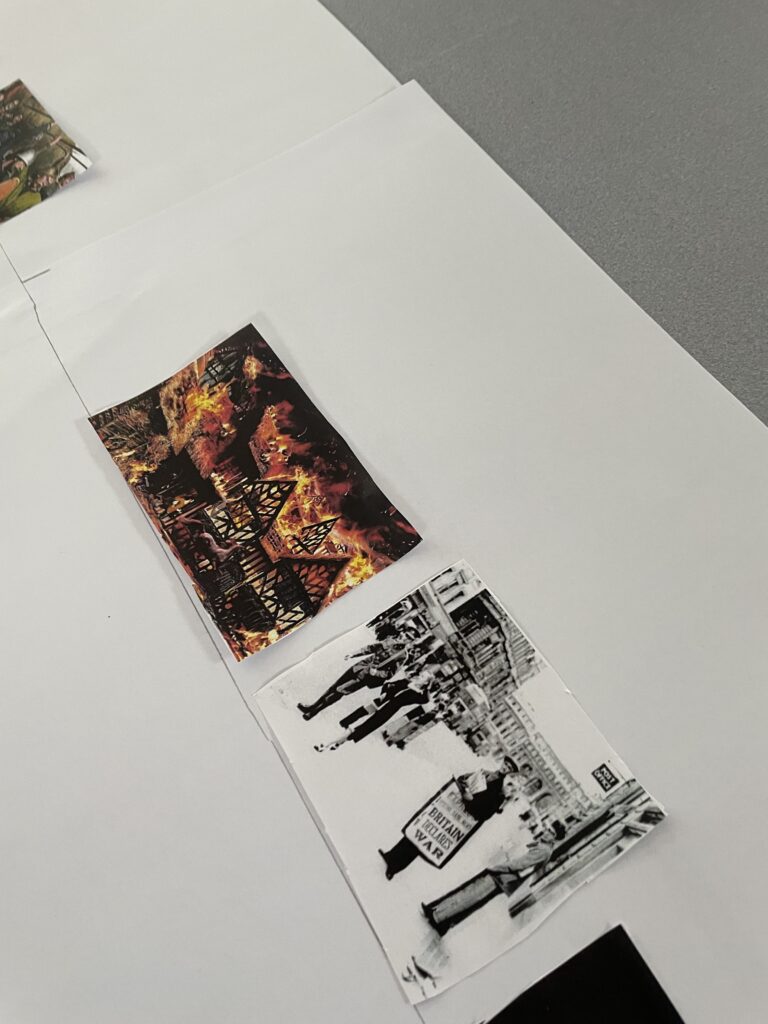
One of the best activities to encourage children to understand the idea of being part of history is to help them create My Life Timelines depicting their history and accomplishments. 
Help your child to create a timeline at home. They can add dates, photos and pictures. Encourage them to bring their completed work into school.
A great start!
I would just like to say how impressed I’ve been with all the children starting back at school. Everyone is looking very smart in the school uniform and PE uniform- thank you for following our policy on this.
The children have been so enthusiastic about meeting their new teachers, seeing their friends again and enjoying their new learning. Every Friday, we have an achieve and believe collective worship where we hand out certificates. On Friday, the children were fantastic at telling me about their achievements just in the first four days of being back at school!
This week, we welcome the remainder of our Reception children; they’ve all settled in so well. It’s wonderful to walk around school and see happy and healthy children.
9th September 2022
Year 3 spellings
We are recapping some Year 2 common exception words.
- because
- children
- school
- people
- could
- would
- friend
- where
- were
Welcome to Year 3!
Wow, Year 3 have come back with a fantastic attitude and I have thoroughly enjoyed our first week together!
Please see below some important information:
- P.E. days are Thursday and Friday (please come into school in your P.E kit on these days). Please check the uniform policy for appropriate PE kit.
- Homework will be sent out every Friday. Please ensure your child arrives at school with their homework books on this day.
- Spellings – your child will come home with a list of spellings that will be tested the following Friday.
- Times Tables – your child will come home with a weekly times tables target.
This half term our Christian value is perseverance, which many children have shown already to achieve lots in their learning.
In Religious Education we are answering the big question “How do the five pillars guide Muslims?” We started by recapping what the children have already learnt about Islam. They really impressed me with their knowledge and recollection of key facts such as the Qur’an is the Islamic holy book and Muslims worship in a mosque. We then thought about some key artefacts. We researched some of these artefacts, considering what they represent to the Islamic faith and how they are used.
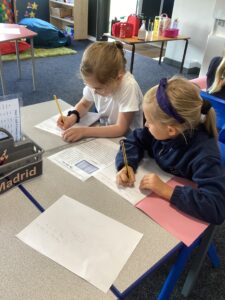
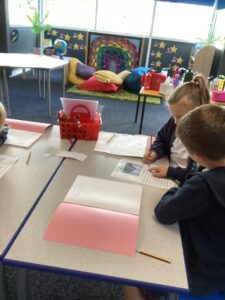
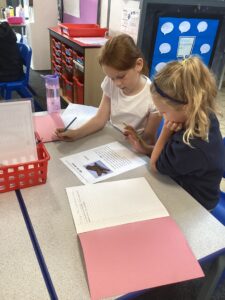
A Fantastic First Week!
Hello everyone! Mr Freeman here with our first official Year 5/6 post of 2022/23. I hope you are all happy, healthy and excited for the upcoming year.
First of all, I would like to start by saying a massive thankyou to all pupils in Year 5 and 6. It’s never easy starting somewhere new – there are many emotions that both pupils and adults have to deal with. However, every single person in the classroom has made me feel so incredibly welcome. From the “Hello Mr Freeman” in the mornings, to playing zombie tag outside, I’ve really enjoyed getting to know everyone and they’ve allowed me to settle in quickly and comfortably.
On top of that, the learning this week has been outstanding! The resilience to improve our handwriting, the British history knowledge in our topic learning and the fantastic levels of engagement in our new class novel are just some examples of the excellent week we’ve had.
If you’re wanting to build on the learning at home, here’s a quick breakdown of what we’re learning in lessons:
- Writing – capital letters, squashed sentences and basic punctuation
- Spelling – homophones (were, where, wear, two, too, to, which, witch)
- Handwriting – forming capital letters from the top and joining lower case letters
- Reading – class novel (Secrets of a Sun King by Emma Carroll) and fluency
- Maths – Roman Numerals (Year 5) and place value up to 1,000,000 (Year 6)
- History – Stone Age to Iron Age and the Ancient Egyptians
- Biology – classifying plants and animals (Carl Linnaeus is our featured scientist this half term)
- Living and Learning/Christian values – I follow the school rules / perseverance
- PE – ball skills and teamwork
Thanks again, Year 5/6 – I’m looking forward to a brilliant year together!
Mr Freeman
Dates for your diary
Over the course of the year we will be holding lots of exciting events for you to get involved in.
If you have any questions about any of the sessions please do not hesitate to get in touch.
The Reception Team